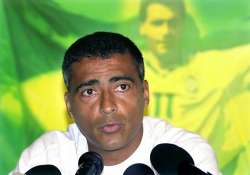Romario Slams FIFA World Cup 2014 Demands
London, Oct 11: Former Brazil football star Romario has said Fifa must not be allowed to dictate changes to Brazilian law ahead of the World Cup in 2014.Romario - who is now a congressman -

London, Oct 11: Former Brazil football star Romario has said Fifa must not be allowed to dictate changes to Brazilian law ahead of the World Cup in 2014.
Romario - who is now a congressman - said laws that guarantee half-price tickets to students and pensioners should not be swept away.
The Brazilian congress is currently debating a bill that would meet Fifa's conditions for the tournament.
Romario, 45, led Brazil's attack when they won the World Cup in 1994.
The former star was speaking on a visit to Rio de Janeiro's Maracana stadium, which is being refurbished for the tournament.
"If Fifa is not put in its rightful place it will soon have more power than our president," he told journalists.
Romario said Fifa could bear the cost of maintaining discounted tickets for students and pensioners during the tournaments estimated at around $100m (£64m).
"Fifa could earn a little bit less so that the Brazilians can take part," he said.
Fifa says the money it makes from World Cup tournaments is reinvested in football.
Earlier Romario expressed himself more strongly on his Twitter account.
"Brazil needs to stop this business of becoming a slave of Fifa," he tweeted.
"The sovereignty of the country must be respected".
Romario also warned that infrastructure projects needed for the tournament, including airports and urban transport, were behind schedule.
"Brazil is certainly not going to stage the best World Cup in history as some have said," he warned.
"It is not going to be a World Cup for the Brazilian people".
Lat month the head of Fifa Sepp Blatter wrote to Brazilian President Dilma Rousseff to express concern over delays in the construction of stadiums and infrastructure for the World Cup.
Fifa has also been pressing for the rapid approval of the World Cup law, which also covers the protection of trademarks, television rights and the sale of alcohol in stadiums.